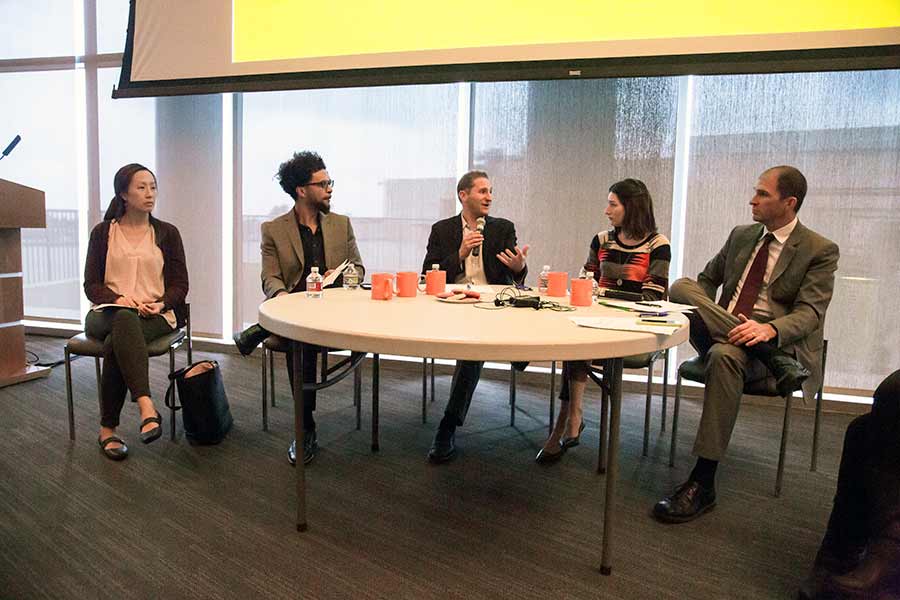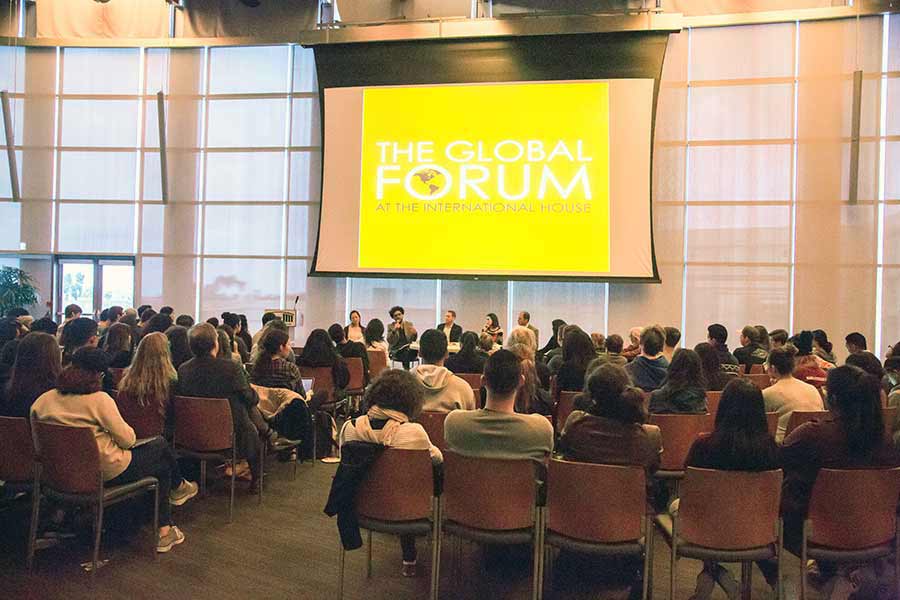Published Date
Humanities, Social Sciences Professors Discuss a Future with Trump

Arts and Humanities and social sciences faculty are joined by a local nonprofit representative on the panel. Pictured from left to right: Nancy Kwak, Dennis Childs, Thad Kousser, Ashely Rodriguez and Zoltan Hajnal. Photo by Emily Zheng
As the United States prepares for a future under the leadership of President Donald Trump, The Global Forum at International House provided a space for community discourse that examined what we know—and what we don’t know—about the new presidency. Addressing that uncertainty was a diverse group of experts from the humanities and social sciences, just days before the inauguration.
Held Jan. 18, “The Next 4 Years: Issues and Predictions for the Trump Administration” featured insights into the Trump era on topics ranging from foreign policy and immigration to law enforcement and housing. Will the U.S. drastically change, or will there be more of the same than most might think? Answering was an interdisciplinary panel, including Nancy Kwak of the Department of History, Dennis Childs of the Department of Literature, Thad Kousser and Zoltan Hajnal of the Department of Political Science, and Ashley Rodriquez, a local nonprofit representative from the Center on Policy Initiatives.
As a political scientist, Kousser said the U.S. will not change as dramatically as some believe because of checks and balances placed on the president in general. Hajnal, however, offered a sense that Trump represents a radical shift from the norm, especially since his real views are essentially unknown. Both professors agreed that any president can impact policy, and Hajnal noted that chief executives are free to act unilaterally in many foreign matters.
Trump’s presidential impact may occur through the reach of the Supreme Court, Kousser said, while Hajnal added that the president’s appointment of generals and businessmen could indicate more military and business support. Kousser further said Trump will likely continue to move the U.S. away from a nation-building policy as President Barack Obama had done, keeping a status quo that most are familiar with.
Historian Kwak pointed out a collective denial of history and an anti-intellectualism present in politics today, and Childs, through a lens of cultural studies, encouraged mindfulness of the “longer optic of history”—the 500 years of fierce imperialistic and racial struggle. In this context, a Trump administration was not going to change much.

Theaudience listens intently to the panelists during the Jan. 18 Global Forum at International House program, “The Next 4 Years: Issues and Predictions for the Trump Administration.”
“We have to be careful with exceptionalizing these next four years,” Childs said, citing a history of white supremacy—a systemic structure firmly in place and upon which Trump plays. Childs also referenced the “prison industrial complex,” adding that the state has taken over the role of the plantation master.
A discussion of the prison system and law enforcement led to Rodriguez’s mention of a local movement called Justice 4 SD 33, a response to charges filed against individuals under a gang-conspiracy law. Rodriguez also asked the audience to think about what the Trump presidency means to local immigrants and refugees, emphasizing the need for municipalities to respond to potential, federal-level action.
Immigration itself was a topic the moderator was looking to explore, and Kwak contributed by questioning the different narratives we tell about immigration, especially through our education system. “Immigration is at the heart of the problem because there is no agreement over its role,” she asserted.
Both Kousser and Hajnal focused on the administration’s potential impact on the path to citizenship and on the current DREAMers — undocumented immigrant youth who meet the requirements of the Development, Relief and Education for Alien Minors Act. Kousser said that Trump, so far, leading up to the inauguration, focused more on the symbols of immigration policy, like calling to build a wall along the U.S.-Mexico border, than actual policy. It remains to be seen, he said, what real changes take place beyond the “symbolic politics.”
Housing and home ownership was also an important topic, and Kwak addressed the issue as the basis of economic security. “The mortgage tax deduction is the biggest public-housing program we have for middle-class America,” she said. Both Trump and the Republican Party have talked about abolishing the long-standing tax benefit, signifying a tangible, and widely felt, shift in public policy under the new administration.
Rodriguez responded, saying that local housing is not in line with current wages, and many young professionals have no hope of owning a home. “There’s a difference between affordable housing and housing affordability,” she said, calling for change.
The program came to an end with a lively question and answer period. Global Forum Fellow and moderator Soraya Abuelhiga encouraged audience members to continue the conversation beyond the International House event.
Share This:
Stay in the Know
Keep up with all the latest from UC San Diego. Subscribe to the newsletter today.



